Legal Aspects of Business
VerifiedAdded on 2023/01/09
|9
|2960
|34
AI Summary
This document explores the legal aspects of business, including relevant legislation, case law, and the process of incorporation under the Companies Act 2006. It explains the principles of corporate personality and limited liability, and discusses the advantages and disadvantages of separate legal entity and limited liability.
Contribute Materials
Your contribution can guide someone’s learning journey. Share your
documents today.

LEGAL ASPECTS OF
BUSINESS
BUSINESS
Secure Best Marks with AI Grader
Need help grading? Try our AI Grader for instant feedback on your assignments.
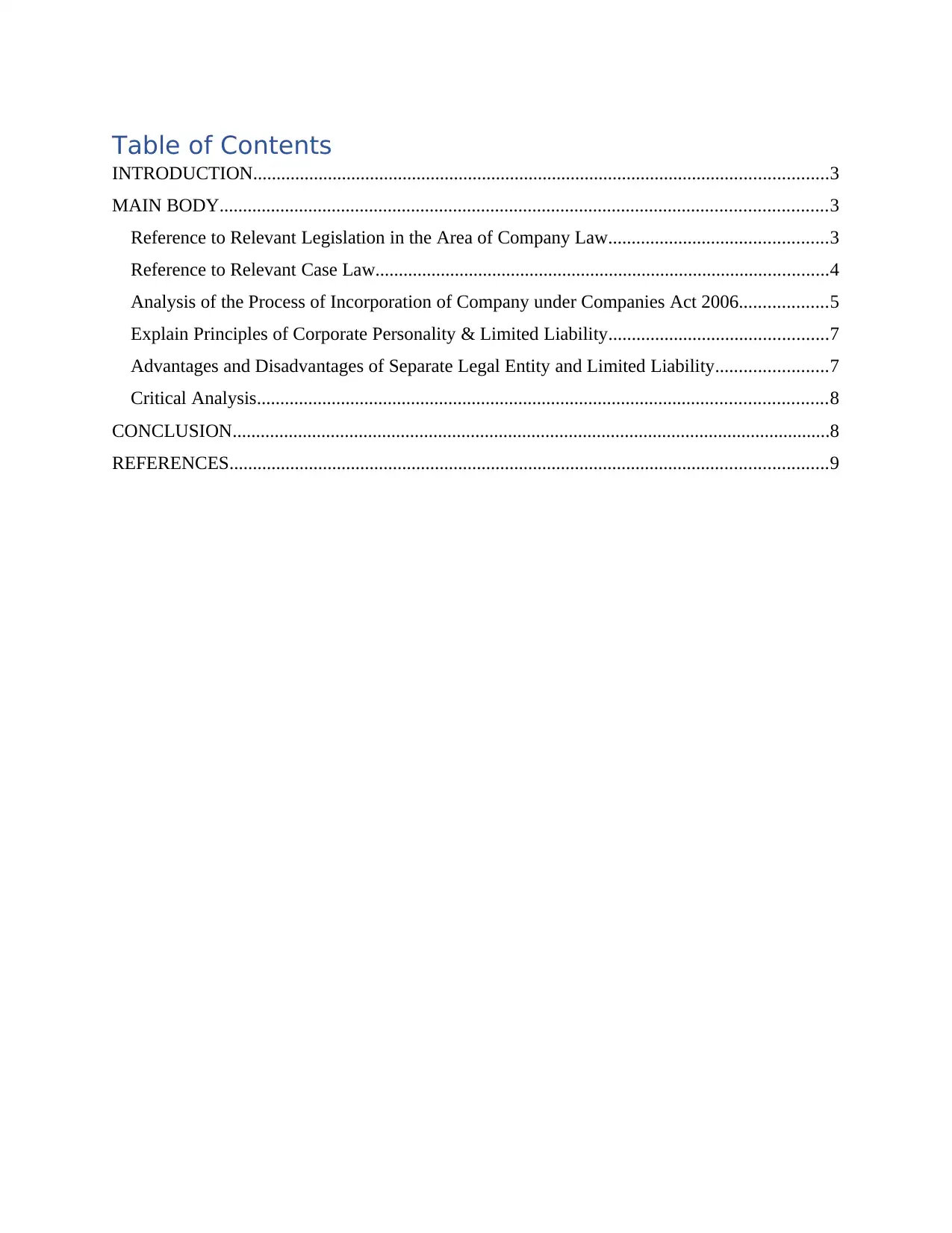
Table of Contents
INTRODUCTION...........................................................................................................................3
MAIN BODY..................................................................................................................................3
Reference to Relevant Legislation in the Area of Company Law...............................................3
Reference to Relevant Case Law.................................................................................................4
Analysis of the Process of Incorporation of Company under Companies Act 2006...................5
Explain Principles of Corporate Personality & Limited Liability...............................................7
Advantages and Disadvantages of Separate Legal Entity and Limited Liability........................7
Critical Analysis..........................................................................................................................8
CONCLUSION................................................................................................................................8
REFERENCES................................................................................................................................9
INTRODUCTION...........................................................................................................................3
MAIN BODY..................................................................................................................................3
Reference to Relevant Legislation in the Area of Company Law...............................................3
Reference to Relevant Case Law.................................................................................................4
Analysis of the Process of Incorporation of Company under Companies Act 2006...................5
Explain Principles of Corporate Personality & Limited Liability...............................................7
Advantages and Disadvantages of Separate Legal Entity and Limited Liability........................7
Critical Analysis..........................................................................................................................8
CONCLUSION................................................................................................................................8
REFERENCES................................................................................................................................9
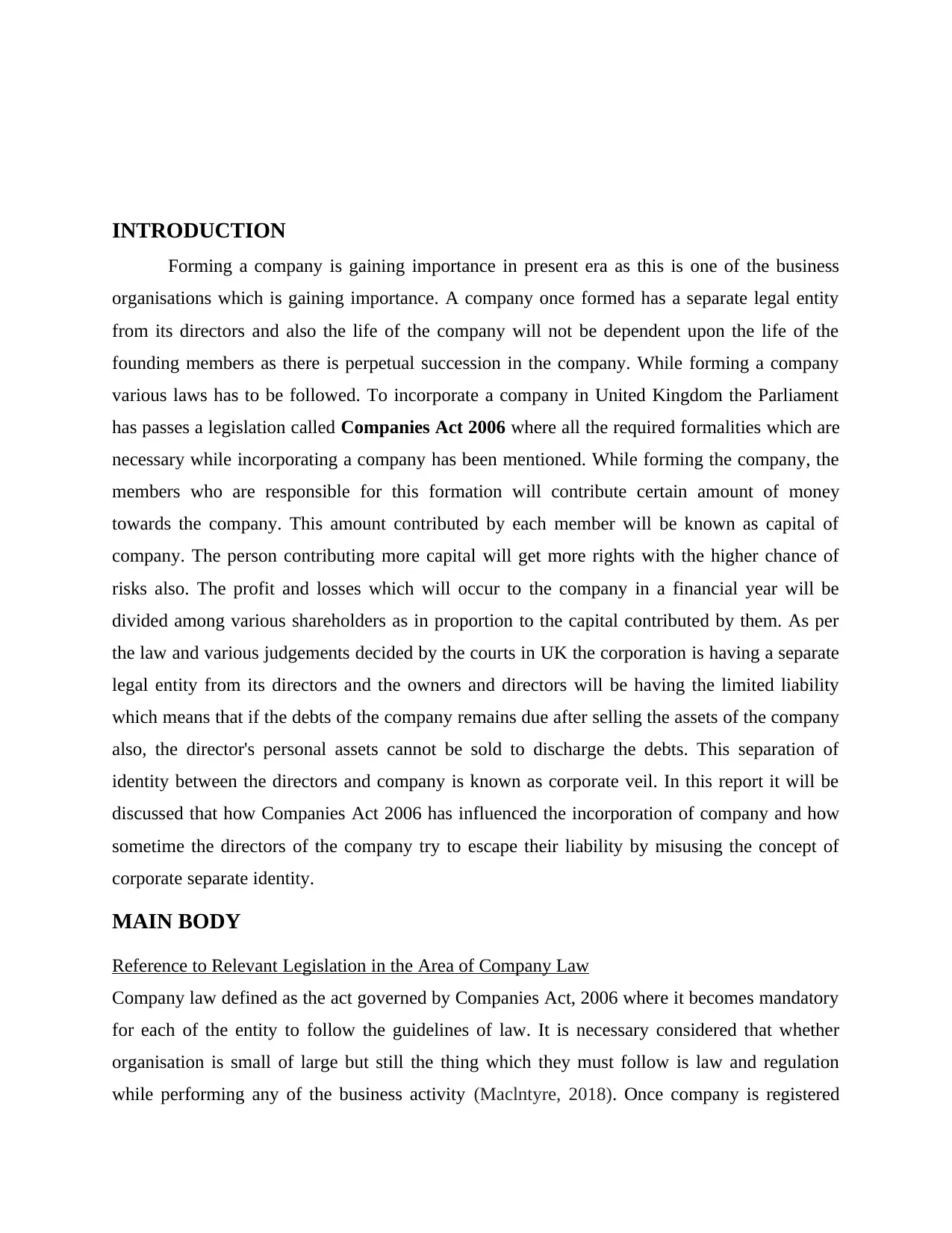
INTRODUCTION
Forming a company is gaining importance in present era as this is one of the business
organisations which is gaining importance. A company once formed has a separate legal entity
from its directors and also the life of the company will not be dependent upon the life of the
founding members as there is perpetual succession in the company. While forming a company
various laws has to be followed. To incorporate a company in United Kingdom the Parliament
has passes a legislation called Companies Act 2006 where all the required formalities which are
necessary while incorporating a company has been mentioned. While forming the company, the
members who are responsible for this formation will contribute certain amount of money
towards the company. This amount contributed by each member will be known as capital of
company. The person contributing more capital will get more rights with the higher chance of
risks also. The profit and losses which will occur to the company in a financial year will be
divided among various shareholders as in proportion to the capital contributed by them. As per
the law and various judgements decided by the courts in UK the corporation is having a separate
legal entity from its directors and the owners and directors will be having the limited liability
which means that if the debts of the company remains due after selling the assets of the company
also, the director's personal assets cannot be sold to discharge the debts. This separation of
identity between the directors and company is known as corporate veil. In this report it will be
discussed that how Companies Act 2006 has influenced the incorporation of company and how
sometime the directors of the company try to escape their liability by misusing the concept of
corporate separate identity.
MAIN BODY
Reference to Relevant Legislation in the Area of Company Law
Company law defined as the act governed by Companies Act, 2006 where it becomes mandatory
for each of the entity to follow the guidelines of law. It is necessary considered that whether
organisation is small of large but still the thing which they must follow is law and regulation
while performing any of the business activity (Maclntyre, 2018). Once company is registered
Forming a company is gaining importance in present era as this is one of the business
organisations which is gaining importance. A company once formed has a separate legal entity
from its directors and also the life of the company will not be dependent upon the life of the
founding members as there is perpetual succession in the company. While forming a company
various laws has to be followed. To incorporate a company in United Kingdom the Parliament
has passes a legislation called Companies Act 2006 where all the required formalities which are
necessary while incorporating a company has been mentioned. While forming the company, the
members who are responsible for this formation will contribute certain amount of money
towards the company. This amount contributed by each member will be known as capital of
company. The person contributing more capital will get more rights with the higher chance of
risks also. The profit and losses which will occur to the company in a financial year will be
divided among various shareholders as in proportion to the capital contributed by them. As per
the law and various judgements decided by the courts in UK the corporation is having a separate
legal entity from its directors and the owners and directors will be having the limited liability
which means that if the debts of the company remains due after selling the assets of the company
also, the director's personal assets cannot be sold to discharge the debts. This separation of
identity between the directors and company is known as corporate veil. In this report it will be
discussed that how Companies Act 2006 has influenced the incorporation of company and how
sometime the directors of the company try to escape their liability by misusing the concept of
corporate separate identity.
MAIN BODY
Reference to Relevant Legislation in the Area of Company Law
Company law defined as the act governed by Companies Act, 2006 where it becomes mandatory
for each of the entity to follow the guidelines of law. It is necessary considered that whether
organisation is small of large but still the thing which they must follow is law and regulation
while performing any of the business activity (Maclntyre, 2018). Once company is registered
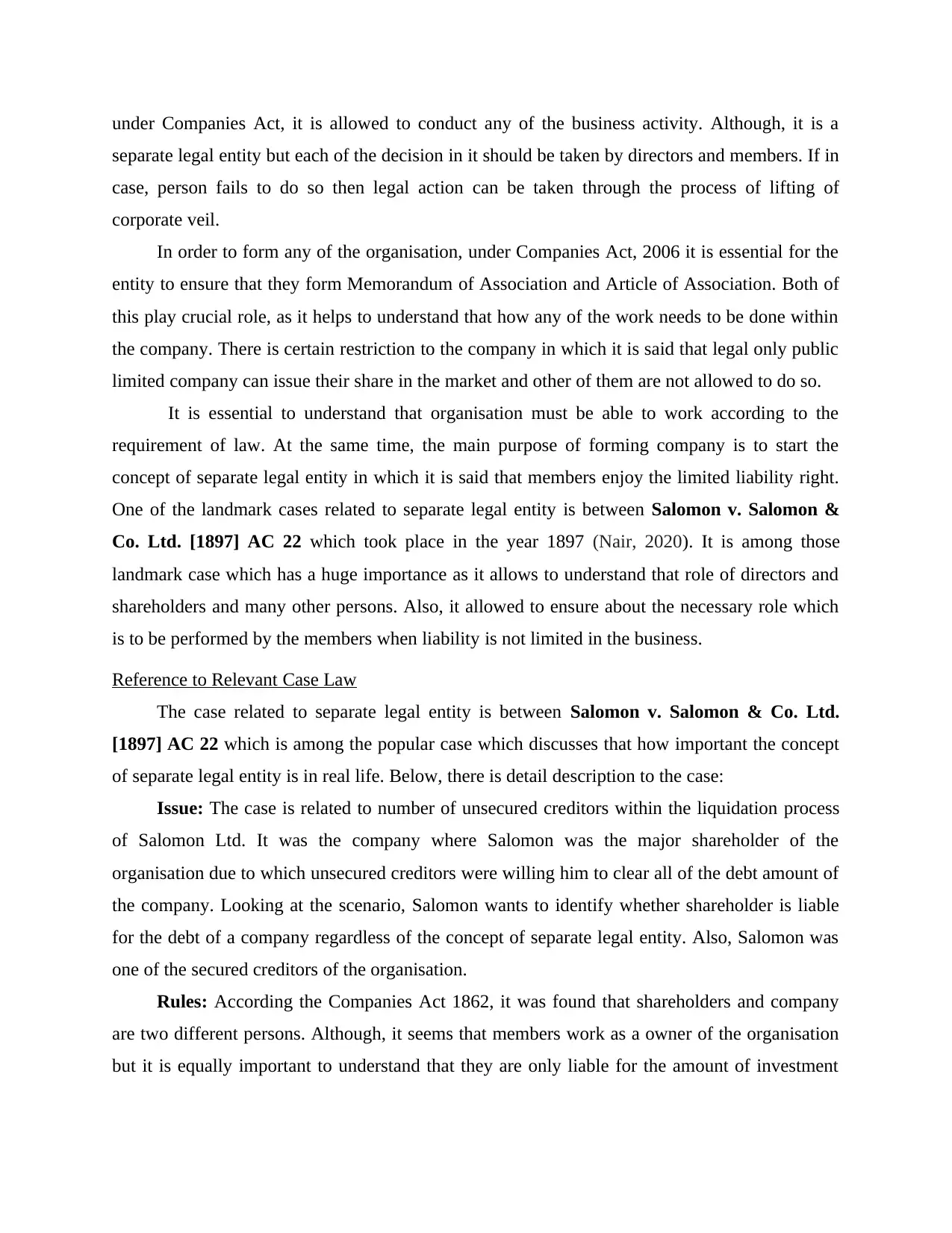
under Companies Act, it is allowed to conduct any of the business activity. Although, it is a
separate legal entity but each of the decision in it should be taken by directors and members. If in
case, person fails to do so then legal action can be taken through the process of lifting of
corporate veil.
In order to form any of the organisation, under Companies Act, 2006 it is essential for the
entity to ensure that they form Memorandum of Association and Article of Association. Both of
this play crucial role, as it helps to understand that how any of the work needs to be done within
the company. There is certain restriction to the company in which it is said that legal only public
limited company can issue their share in the market and other of them are not allowed to do so.
It is essential to understand that organisation must be able to work according to the
requirement of law. At the same time, the main purpose of forming company is to start the
concept of separate legal entity in which it is said that members enjoy the limited liability right.
One of the landmark cases related to separate legal entity is between Salomon v. Salomon &
Co. Ltd. [1897] AC 22 which took place in the year 1897 (Nair, 2020). It is among those
landmark case which has a huge importance as it allows to understand that role of directors and
shareholders and many other persons. Also, it allowed to ensure about the necessary role which
is to be performed by the members when liability is not limited in the business.
Reference to Relevant Case Law
The case related to separate legal entity is between Salomon v. Salomon & Co. Ltd.
[1897] AC 22 which is among the popular case which discusses that how important the concept
of separate legal entity is in real life. Below, there is detail description to the case:
Issue: The case is related to number of unsecured creditors within the liquidation process
of Salomon Ltd. It was the company where Salomon was the major shareholder of the
organisation due to which unsecured creditors were willing him to clear all of the debt amount of
the company. Looking at the scenario, Salomon wants to identify whether shareholder is liable
for the debt of a company regardless of the concept of separate legal entity. Also, Salomon was
one of the secured creditors of the organisation.
Rules: According the Companies Act 1862, it was found that shareholders and company
are two different persons. Although, it seems that members work as a owner of the organisation
but it is equally important to understand that they are only liable for the amount of investment
separate legal entity but each of the decision in it should be taken by directors and members. If in
case, person fails to do so then legal action can be taken through the process of lifting of
corporate veil.
In order to form any of the organisation, under Companies Act, 2006 it is essential for the
entity to ensure that they form Memorandum of Association and Article of Association. Both of
this play crucial role, as it helps to understand that how any of the work needs to be done within
the company. There is certain restriction to the company in which it is said that legal only public
limited company can issue their share in the market and other of them are not allowed to do so.
It is essential to understand that organisation must be able to work according to the
requirement of law. At the same time, the main purpose of forming company is to start the
concept of separate legal entity in which it is said that members enjoy the limited liability right.
One of the landmark cases related to separate legal entity is between Salomon v. Salomon &
Co. Ltd. [1897] AC 22 which took place in the year 1897 (Nair, 2020). It is among those
landmark case which has a huge importance as it allows to understand that role of directors and
shareholders and many other persons. Also, it allowed to ensure about the necessary role which
is to be performed by the members when liability is not limited in the business.
Reference to Relevant Case Law
The case related to separate legal entity is between Salomon v. Salomon & Co. Ltd.
[1897] AC 22 which is among the popular case which discusses that how important the concept
of separate legal entity is in real life. Below, there is detail description to the case:
Issue: The case is related to number of unsecured creditors within the liquidation process
of Salomon Ltd. It was the company where Salomon was the major shareholder of the
organisation due to which unsecured creditors were willing him to clear all of the debt amount of
the company. Looking at the scenario, Salomon wants to identify whether shareholder is liable
for the debt of a company regardless of the concept of separate legal entity. Also, Salomon was
one of the secured creditors of the organisation.
Rules: According the Companies Act 1862, it was found that shareholders and company
are two different persons. Although, it seems that members work as a owner of the organisation
but it is equally important to understand that they are only liable for the amount of investment
Secure Best Marks with AI Grader
Need help grading? Try our AI Grader for instant feedback on your assignments.
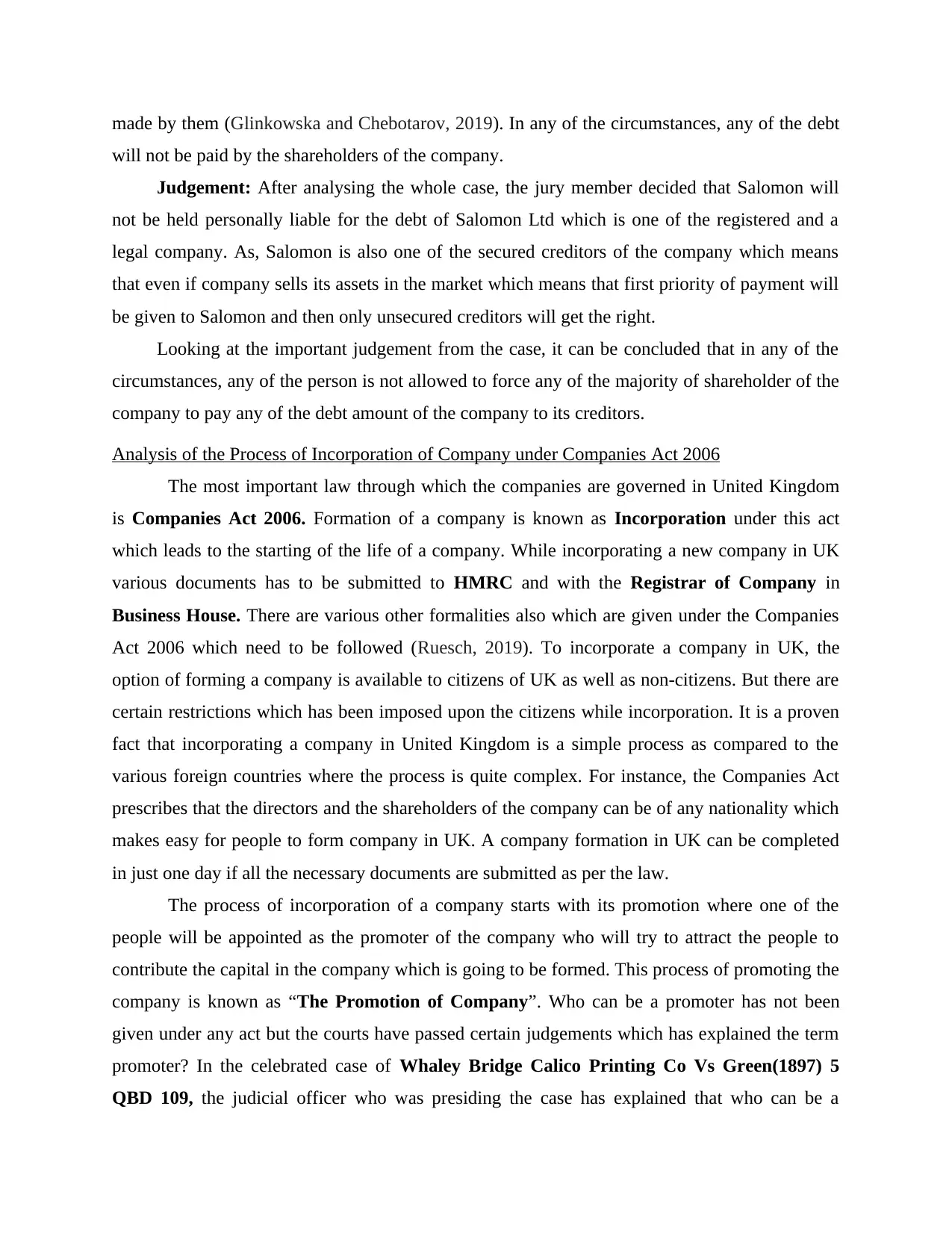
made by them (Glinkowska and Chebotarov, 2019). In any of the circumstances, any of the debt
will not be paid by the shareholders of the company.
Judgement: After analysing the whole case, the jury member decided that Salomon will
not be held personally liable for the debt of Salomon Ltd which is one of the registered and a
legal company. As, Salomon is also one of the secured creditors of the company which means
that even if company sells its assets in the market which means that first priority of payment will
be given to Salomon and then only unsecured creditors will get the right.
Looking at the important judgement from the case, it can be concluded that in any of the
circumstances, any of the person is not allowed to force any of the majority of shareholder of the
company to pay any of the debt amount of the company to its creditors.
Analysis of the Process of Incorporation of Company under Companies Act 2006
The most important law through which the companies are governed in United Kingdom
is Companies Act 2006. Formation of a company is known as Incorporation under this act
which leads to the starting of the life of a company. While incorporating a new company in UK
various documents has to be submitted to HMRC and with the Registrar of Company in
Business House. There are various other formalities also which are given under the Companies
Act 2006 which need to be followed (Ruesch, 2019). To incorporate a company in UK, the
option of forming a company is available to citizens of UK as well as non-citizens. But there are
certain restrictions which has been imposed upon the citizens while incorporation. It is a proven
fact that incorporating a company in United Kingdom is a simple process as compared to the
various foreign countries where the process is quite complex. For instance, the Companies Act
prescribes that the directors and the shareholders of the company can be of any nationality which
makes easy for people to form company in UK. A company formation in UK can be completed
in just one day if all the necessary documents are submitted as per the law.
The process of incorporation of a company starts with its promotion where one of the
people will be appointed as the promoter of the company who will try to attract the people to
contribute the capital in the company which is going to be formed. This process of promoting the
company is known as “The Promotion of Company”. Who can be a promoter has not been
given under any act but the courts have passed certain judgements which has explained the term
promoter? In the celebrated case of Whaley Bridge Calico Printing Co Vs Green(1897) 5
QBD 109, the judicial officer who was presiding the case has explained that who can be a
will not be paid by the shareholders of the company.
Judgement: After analysing the whole case, the jury member decided that Salomon will
not be held personally liable for the debt of Salomon Ltd which is one of the registered and a
legal company. As, Salomon is also one of the secured creditors of the company which means
that even if company sells its assets in the market which means that first priority of payment will
be given to Salomon and then only unsecured creditors will get the right.
Looking at the important judgement from the case, it can be concluded that in any of the
circumstances, any of the person is not allowed to force any of the majority of shareholder of the
company to pay any of the debt amount of the company to its creditors.
Analysis of the Process of Incorporation of Company under Companies Act 2006
The most important law through which the companies are governed in United Kingdom
is Companies Act 2006. Formation of a company is known as Incorporation under this act
which leads to the starting of the life of a company. While incorporating a new company in UK
various documents has to be submitted to HMRC and with the Registrar of Company in
Business House. There are various other formalities also which are given under the Companies
Act 2006 which need to be followed (Ruesch, 2019). To incorporate a company in UK, the
option of forming a company is available to citizens of UK as well as non-citizens. But there are
certain restrictions which has been imposed upon the citizens while incorporation. It is a proven
fact that incorporating a company in United Kingdom is a simple process as compared to the
various foreign countries where the process is quite complex. For instance, the Companies Act
prescribes that the directors and the shareholders of the company can be of any nationality which
makes easy for people to form company in UK. A company formation in UK can be completed
in just one day if all the necessary documents are submitted as per the law.
The process of incorporation of a company starts with its promotion where one of the
people will be appointed as the promoter of the company who will try to attract the people to
contribute the capital in the company which is going to be formed. This process of promoting the
company is known as “The Promotion of Company”. Who can be a promoter has not been
given under any act but the courts have passed certain judgements which has explained the term
promoter? In the celebrated case of Whaley Bridge Calico Printing Co Vs Green(1897) 5
QBD 109, the judicial officer who was presiding the case has explained that who can be a
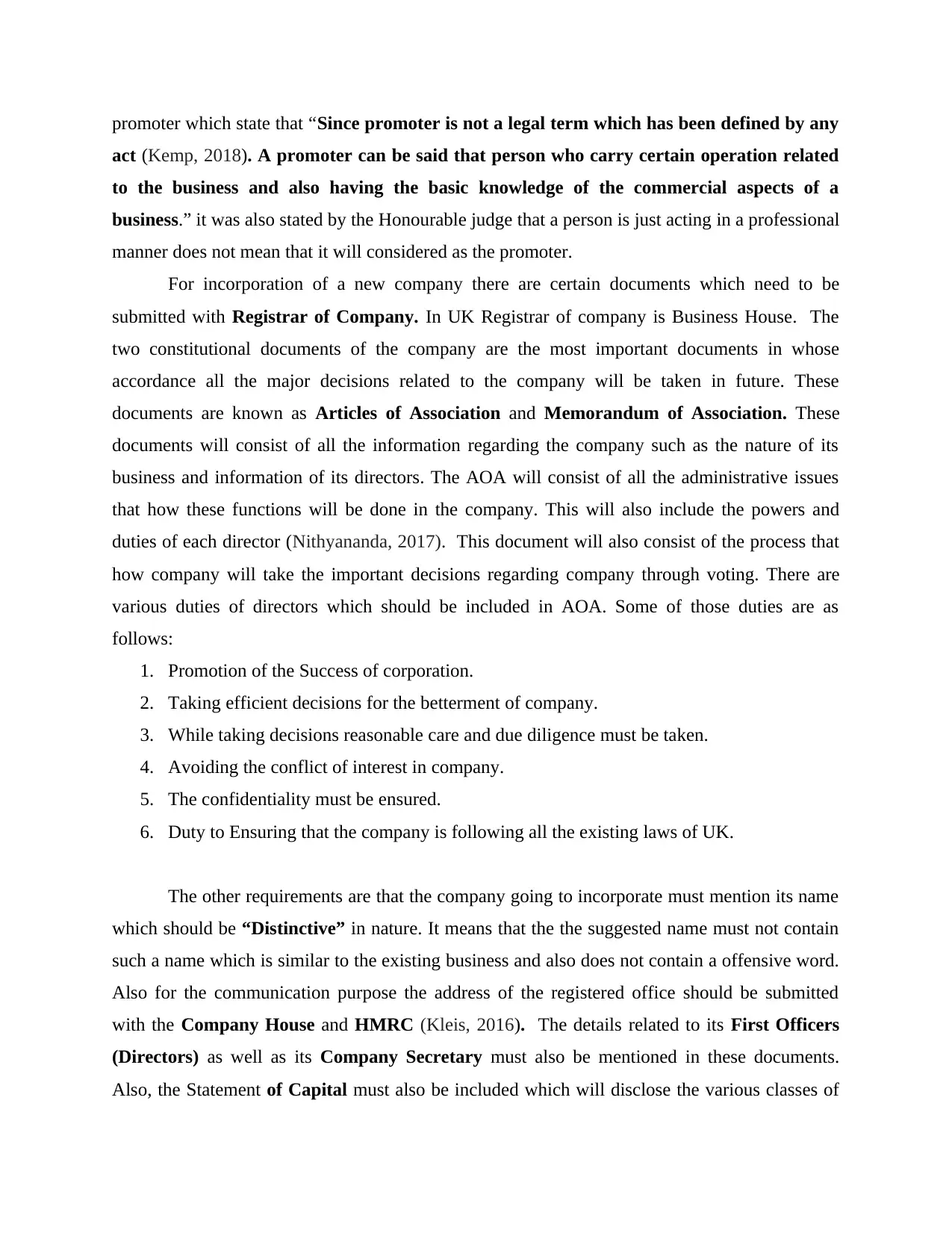
promoter which state that “Since promoter is not a legal term which has been defined by any
act (Kemp, 2018). A promoter can be said that person who carry certain operation related
to the business and also having the basic knowledge of the commercial aspects of a
business.” it was also stated by the Honourable judge that a person is just acting in a professional
manner does not mean that it will considered as the promoter.
For incorporation of a new company there are certain documents which need to be
submitted with Registrar of Company. In UK Registrar of company is Business House. The
two constitutional documents of the company are the most important documents in whose
accordance all the major decisions related to the company will be taken in future. These
documents are known as Articles of Association and Memorandum of Association. These
documents will consist of all the information regarding the company such as the nature of its
business and information of its directors. The AOA will consist of all the administrative issues
that how these functions will be done in the company. This will also include the powers and
duties of each director (Nithyananda, 2017). This document will also consist of the process that
how company will take the important decisions regarding company through voting. There are
various duties of directors which should be included in AOA. Some of those duties are as
follows:
1. Promotion of the Success of corporation.
2. Taking efficient decisions for the betterment of company.
3. While taking decisions reasonable care and due diligence must be taken.
4. Avoiding the conflict of interest in company.
5. The confidentiality must be ensured.
6. Duty to Ensuring that the company is following all the existing laws of UK.
The other requirements are that the company going to incorporate must mention its name
which should be “Distinctive” in nature. It means that the the suggested name must not contain
such a name which is similar to the existing business and also does not contain a offensive word.
Also for the communication purpose the address of the registered office should be submitted
with the Company House and HMRC (Kleis, 2016). The details related to its First Officers
(Directors) as well as its Company Secretary must also be mentioned in these documents.
Also, the Statement of Capital must also be included which will disclose the various classes of
act (Kemp, 2018). A promoter can be said that person who carry certain operation related
to the business and also having the basic knowledge of the commercial aspects of a
business.” it was also stated by the Honourable judge that a person is just acting in a professional
manner does not mean that it will considered as the promoter.
For incorporation of a new company there are certain documents which need to be
submitted with Registrar of Company. In UK Registrar of company is Business House. The
two constitutional documents of the company are the most important documents in whose
accordance all the major decisions related to the company will be taken in future. These
documents are known as Articles of Association and Memorandum of Association. These
documents will consist of all the information regarding the company such as the nature of its
business and information of its directors. The AOA will consist of all the administrative issues
that how these functions will be done in the company. This will also include the powers and
duties of each director (Nithyananda, 2017). This document will also consist of the process that
how company will take the important decisions regarding company through voting. There are
various duties of directors which should be included in AOA. Some of those duties are as
follows:
1. Promotion of the Success of corporation.
2. Taking efficient decisions for the betterment of company.
3. While taking decisions reasonable care and due diligence must be taken.
4. Avoiding the conflict of interest in company.
5. The confidentiality must be ensured.
6. Duty to Ensuring that the company is following all the existing laws of UK.
The other requirements are that the company going to incorporate must mention its name
which should be “Distinctive” in nature. It means that the the suggested name must not contain
such a name which is similar to the existing business and also does not contain a offensive word.
Also for the communication purpose the address of the registered office should be submitted
with the Company House and HMRC (Kleis, 2016). The details related to its First Officers
(Directors) as well as its Company Secretary must also be mentioned in these documents.
Also, the Statement of Capital must also be included which will disclose the various classes of
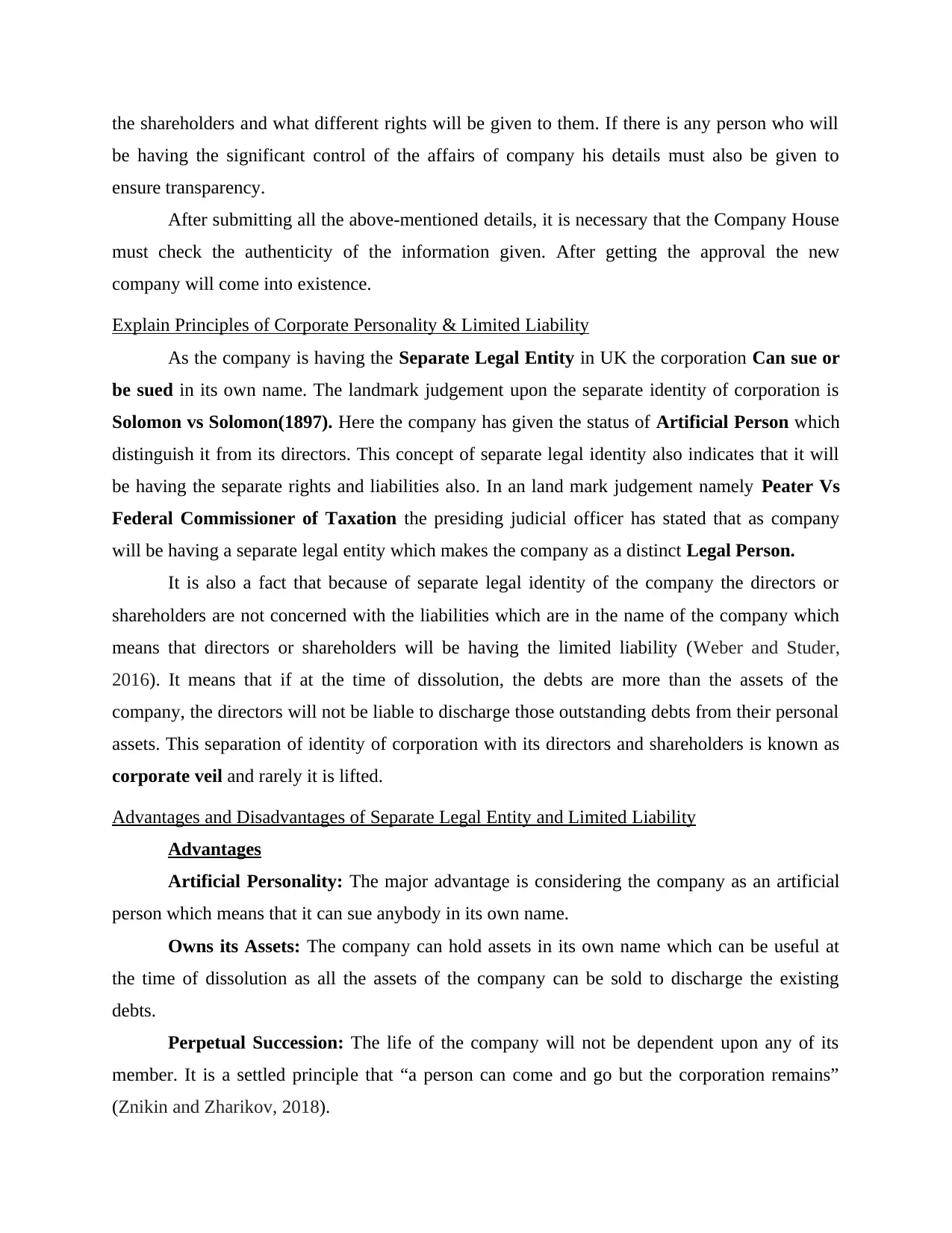
the shareholders and what different rights will be given to them. If there is any person who will
be having the significant control of the affairs of company his details must also be given to
ensure transparency.
After submitting all the above-mentioned details, it is necessary that the Company House
must check the authenticity of the information given. After getting the approval the new
company will come into existence.
Explain Principles of Corporate Personality & Limited Liability
As the company is having the Separate Legal Entity in UK the corporation Can sue or
be sued in its own name. The landmark judgement upon the separate identity of corporation is
Solomon vs Solomon(1897). Here the company has given the status of Artificial Person which
distinguish it from its directors. This concept of separate legal identity also indicates that it will
be having the separate rights and liabilities also. In an land mark judgement namely Peater Vs
Federal Commissioner of Taxation the presiding judicial officer has stated that as company
will be having a separate legal entity which makes the company as a distinct Legal Person.
It is also a fact that because of separate legal identity of the company the directors or
shareholders are not concerned with the liabilities which are in the name of the company which
means that directors or shareholders will be having the limited liability (Weber and Studer,
2016). It means that if at the time of dissolution, the debts are more than the assets of the
company, the directors will not be liable to discharge those outstanding debts from their personal
assets. This separation of identity of corporation with its directors and shareholders is known as
corporate veil and rarely it is lifted.
Advantages and Disadvantages of Separate Legal Entity and Limited Liability
Advantages
Artificial Personality: The major advantage is considering the company as an artificial
person which means that it can sue anybody in its own name.
Owns its Assets: The company can hold assets in its own name which can be useful at
the time of dissolution as all the assets of the company can be sold to discharge the existing
debts.
Perpetual Succession: The life of the company will not be dependent upon any of its
member. It is a settled principle that “a person can come and go but the corporation remains”
(Znikin and Zharikov, 2018).
be having the significant control of the affairs of company his details must also be given to
ensure transparency.
After submitting all the above-mentioned details, it is necessary that the Company House
must check the authenticity of the information given. After getting the approval the new
company will come into existence.
Explain Principles of Corporate Personality & Limited Liability
As the company is having the Separate Legal Entity in UK the corporation Can sue or
be sued in its own name. The landmark judgement upon the separate identity of corporation is
Solomon vs Solomon(1897). Here the company has given the status of Artificial Person which
distinguish it from its directors. This concept of separate legal identity also indicates that it will
be having the separate rights and liabilities also. In an land mark judgement namely Peater Vs
Federal Commissioner of Taxation the presiding judicial officer has stated that as company
will be having a separate legal entity which makes the company as a distinct Legal Person.
It is also a fact that because of separate legal identity of the company the directors or
shareholders are not concerned with the liabilities which are in the name of the company which
means that directors or shareholders will be having the limited liability (Weber and Studer,
2016). It means that if at the time of dissolution, the debts are more than the assets of the
company, the directors will not be liable to discharge those outstanding debts from their personal
assets. This separation of identity of corporation with its directors and shareholders is known as
corporate veil and rarely it is lifted.
Advantages and Disadvantages of Separate Legal Entity and Limited Liability
Advantages
Artificial Personality: The major advantage is considering the company as an artificial
person which means that it can sue anybody in its own name.
Owns its Assets: The company can hold assets in its own name which can be useful at
the time of dissolution as all the assets of the company can be sold to discharge the existing
debts.
Perpetual Succession: The life of the company will not be dependent upon any of its
member. It is a settled principle that “a person can come and go but the corporation remains”
(Znikin and Zharikov, 2018).
Paraphrase This Document
Need a fresh take? Get an instant paraphrase of this document with our AI Paraphraser
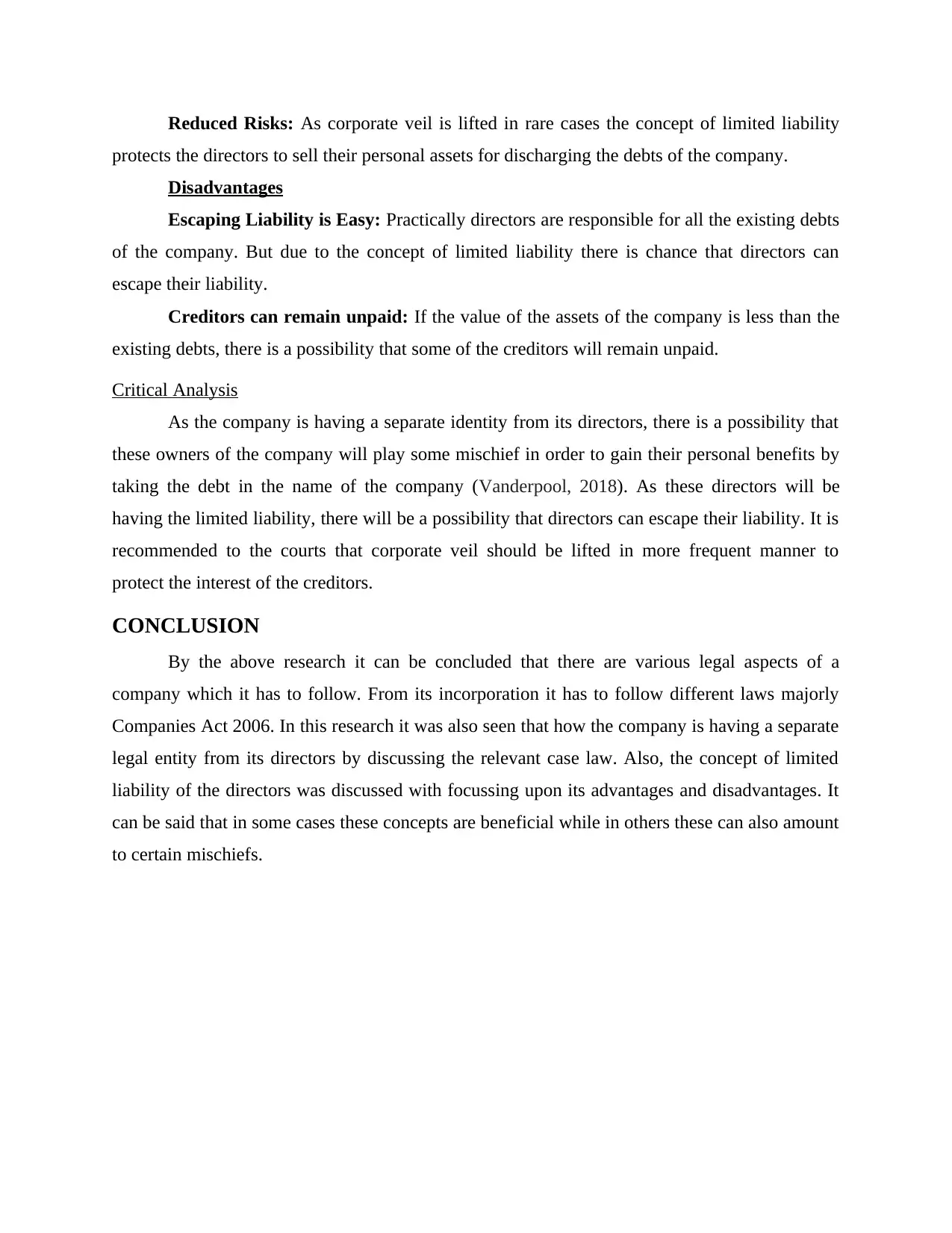
Reduced Risks: As corporate veil is lifted in rare cases the concept of limited liability
protects the directors to sell their personal assets for discharging the debts of the company.
Disadvantages
Escaping Liability is Easy: Practically directors are responsible for all the existing debts
of the company. But due to the concept of limited liability there is chance that directors can
escape their liability.
Creditors can remain unpaid: If the value of the assets of the company is less than the
existing debts, there is a possibility that some of the creditors will remain unpaid.
Critical Analysis
As the company is having a separate identity from its directors, there is a possibility that
these owners of the company will play some mischief in order to gain their personal benefits by
taking the debt in the name of the company (Vanderpool, 2018). As these directors will be
having the limited liability, there will be a possibility that directors can escape their liability. It is
recommended to the courts that corporate veil should be lifted in more frequent manner to
protect the interest of the creditors.
CONCLUSION
By the above research it can be concluded that there are various legal aspects of a
company which it has to follow. From its incorporation it has to follow different laws majorly
Companies Act 2006. In this research it was also seen that how the company is having a separate
legal entity from its directors by discussing the relevant case law. Also, the concept of limited
liability of the directors was discussed with focussing upon its advantages and disadvantages. It
can be said that in some cases these concepts are beneficial while in others these can also amount
to certain mischiefs.
protects the directors to sell their personal assets for discharging the debts of the company.
Disadvantages
Escaping Liability is Easy: Practically directors are responsible for all the existing debts
of the company. But due to the concept of limited liability there is chance that directors can
escape their liability.
Creditors can remain unpaid: If the value of the assets of the company is less than the
existing debts, there is a possibility that some of the creditors will remain unpaid.
Critical Analysis
As the company is having a separate identity from its directors, there is a possibility that
these owners of the company will play some mischief in order to gain their personal benefits by
taking the debt in the name of the company (Vanderpool, 2018). As these directors will be
having the limited liability, there will be a possibility that directors can escape their liability. It is
recommended to the courts that corporate veil should be lifted in more frequent manner to
protect the interest of the creditors.
CONCLUSION
By the above research it can be concluded that there are various legal aspects of a
company which it has to follow. From its incorporation it has to follow different laws majorly
Companies Act 2006. In this research it was also seen that how the company is having a separate
legal entity from its directors by discussing the relevant case law. Also, the concept of limited
liability of the directors was discussed with focussing upon its advantages and disadvantages. It
can be said that in some cases these concepts are beneficial while in others these can also amount
to certain mischiefs.
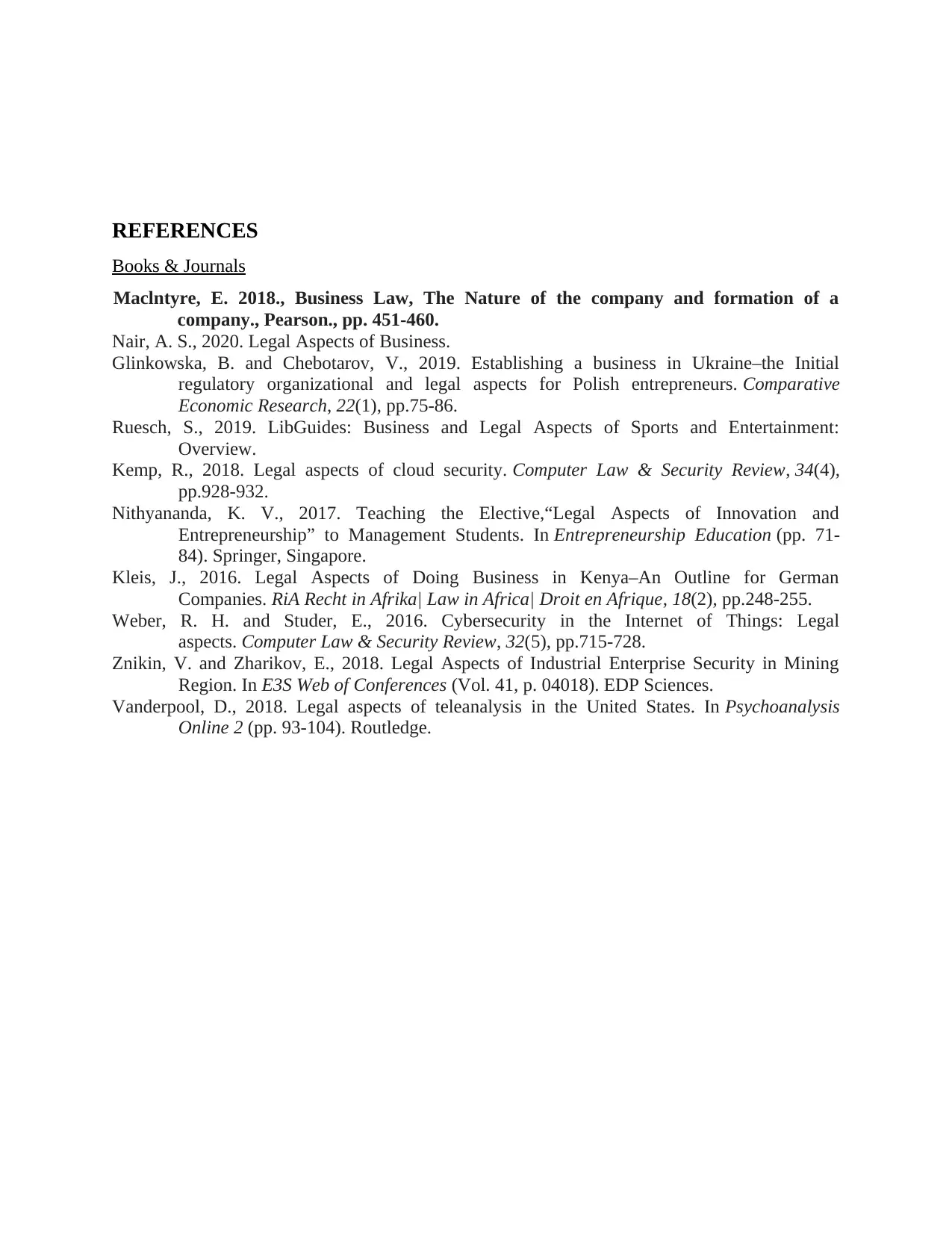
REFERENCES
Books & Journals
Maclntyre, E. 2018., Business Law, The Nature of the company and formation of a
company., Pearson., pp. 451-460.
Nair, A. S., 2020. Legal Aspects of Business.
Glinkowska, B. and Chebotarov, V., 2019. Establishing a business in Ukraine–the Initial
regulatory organizational and legal aspects for Polish entrepreneurs. Comparative
Economic Research, 22(1), pp.75-86.
Ruesch, S., 2019. LibGuides: Business and Legal Aspects of Sports and Entertainment:
Overview.
Kemp, R., 2018. Legal aspects of cloud security. Computer Law & Security Review, 34(4),
pp.928-932.
Nithyananda, K. V., 2017. Teaching the Elective,“Legal Aspects of Innovation and
Entrepreneurship” to Management Students. In Entrepreneurship Education (pp. 71-
84). Springer, Singapore.
Kleis, J., 2016. Legal Aspects of Doing Business in Kenya–An Outline for German
Companies. RiA Recht in Afrika| Law in Africa| Droit en Afrique, 18(2), pp.248-255.
Weber, R. H. and Studer, E., 2016. Cybersecurity in the Internet of Things: Legal
aspects. Computer Law & Security Review, 32(5), pp.715-728.
Znikin, V. and Zharikov, E., 2018. Legal Aspects of Industrial Enterprise Security in Mining
Region. In E3S Web of Conferences (Vol. 41, p. 04018). EDP Sciences.
Vanderpool, D., 2018. Legal aspects of teleanalysis in the United States. In Psychoanalysis
Online 2 (pp. 93-104). Routledge.
Books & Journals
Maclntyre, E. 2018., Business Law, The Nature of the company and formation of a
company., Pearson., pp. 451-460.
Nair, A. S., 2020. Legal Aspects of Business.
Glinkowska, B. and Chebotarov, V., 2019. Establishing a business in Ukraine–the Initial
regulatory organizational and legal aspects for Polish entrepreneurs. Comparative
Economic Research, 22(1), pp.75-86.
Ruesch, S., 2019. LibGuides: Business and Legal Aspects of Sports and Entertainment:
Overview.
Kemp, R., 2018. Legal aspects of cloud security. Computer Law & Security Review, 34(4),
pp.928-932.
Nithyananda, K. V., 2017. Teaching the Elective,“Legal Aspects of Innovation and
Entrepreneurship” to Management Students. In Entrepreneurship Education (pp. 71-
84). Springer, Singapore.
Kleis, J., 2016. Legal Aspects of Doing Business in Kenya–An Outline for German
Companies. RiA Recht in Afrika| Law in Africa| Droit en Afrique, 18(2), pp.248-255.
Weber, R. H. and Studer, E., 2016. Cybersecurity in the Internet of Things: Legal
aspects. Computer Law & Security Review, 32(5), pp.715-728.
Znikin, V. and Zharikov, E., 2018. Legal Aspects of Industrial Enterprise Security in Mining
Region. In E3S Web of Conferences (Vol. 41, p. 04018). EDP Sciences.
Vanderpool, D., 2018. Legal aspects of teleanalysis in the United States. In Psychoanalysis
Online 2 (pp. 93-104). Routledge.
1 out of 9
Related Documents
Your All-in-One AI-Powered Toolkit for Academic Success.
+13062052269
info@desklib.com
Available 24*7 on WhatsApp / Email
![[object Object]](/_next/static/media/star-bottom.7253800d.svg)
Unlock your academic potential
© 2024 | Zucol Services PVT LTD | All rights reserved.





